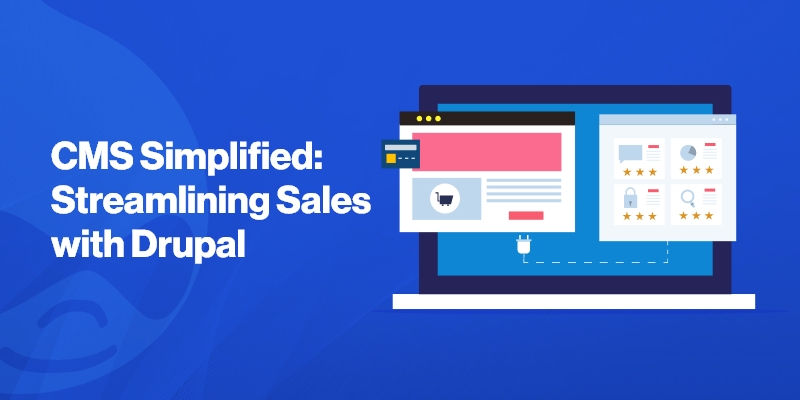CMS Simplified: Streamlining Sales with Drupal

Introduction
In today's competitive digital marketplace, businesses must find every possible advantage to drive sales and increase revenue. One key aspect of this is optimizing the conversion process turning website visitors into paying customers. Drupal, a powerful content management system, can streamline sales and enhance the overall user experience. In this comprehensive guide, we will explore the various strategies and techniques for conversion optimization using Drupal.
Understanding the Sales Funnel
Before delving into the details of using Drupal for conversion optimization, it's essential to understand the sales funnel concept. The sales funnel represents a potential customer's path from initial interaction with your brand to becoming a paying customer. The sales funnel stages typically include awareness, consideration, and decision-making.
By understanding each stage of the sales funnel, businesses can tailor their marketing efforts and website experience to guide users smoothly through the conversion process. Drupal provides the flexibility and functionality to optimize each sales funnel stage effectively.
The Role of Drupal in Conversion Optimization
Drupal is a versatile content management system that empowers businesses to create dynamic and engaging websites. It offers a range of features and modules specifically designed to enhance conversion rates and streamline the sales process.
One of the key advantages of using Drupal for conversion rate optimization is its ability to create personalized experiences for website visitors. With Drupal's flexible user management system, businesses can segment their audience and deliver targeted content and offers based on individual preferences and behavior.
Drupal's modular architecture also allows seamless integration with various third-party tools and services, such as analytics platforms, A/B testing tools, and marketing automation software. These integrations enable businesses to gather valuable data, track user interactions, and analyze the effectiveness of their conversion optimization strategies.
Crafting Compelling Landing Pages
A landing page is a crucial element in the conversion process. It is often the first point of contact between a potential customer and your business. A well-designed landing page can make a significant impact on conversion rates.
Drupal's flexibility allows businesses to create visually appealing and conversion-focused landing pages. Ensure your landing page has a clear and compelling call-to-action (CTA) that encourages visitors to take the desired action, such as purchasing or submitting their contact information.
Leverage Drupal's layout and design capabilities to create a visually appealing landing page that aligns with your brand identity. Use engaging and persuasive copy that highlights the unique selling points of your product or service.
Optimizing the Checkout Process
The checkout process is a critical stage in the sales funnel, and any friction or confusion can lead to cart abandonment. Drupal offers several features and modules to streamline checkout and improve conversion rates.
Firstly, implement a user-friendly and intuitive checkout form. Minimize the number of steps required to complete the purchase and offer guest checkout options to avoid forcing users to create an account.
Use Drupal's e-commerce modules to incorporate secure payment gateways, such as PayPal or Stripe, and offer various payment options to cater to different user preferences.
Implementing real-time shipping rates and order tracking can enhance the overall user experience and instill customer confidence.
Utilizing Data and Analytics
Data and analytics play a pivotal role in conversion optimization. By analyzing user behavior and engagement metrics, businesses can identify areas for improvement and make data-driven decisions.
Drupal integrates seamlessly with popular analytics platforms like Google Analytics. Utilize these tools to track user activity on your website, monitor conversion rates, and identify bottlenecks in the sales process.
Leverage Drupal's capabilities to set up custom tracking events, such as form submissions or button clicks, to gain deeper insights into user interactions and conversion patterns.
Businesses can continuously refine and optimize their conversion strategies by leveraging data and analytics to achieve better results.
Continuous Testing and Iteration
Conversion rate optimization is an ongoing process that requires continuous testing and iteration. Drupal provides several tools and techniques to facilitate this iterative approach.
Utilize Drupal's A/B testing modules to create multiple variants of your landing pages, forms, and checkout process. Test design elements and content variations to identify the most effective combination for maximizing conversions.
Monitor the performance of each variant using analytics and make data-driven decisions on which elements to keep and optimize further.
Regularly review and analyze user feedback and behavior to identify potential pain points or areas of improvement. Drupal's user feedback modules can be leveraged to collect valuable insights from your audience.
Conclusion
Drupal offers a robust platform for businesses to streamline their sales process and optimize conversions. Businesses can ensure a smooth and efficient conversion process on their Drupal-powered websites by understanding the sales funnel, crafting compelling landing pages, optimizing the checkout process, utilizing data and analytics, and engaging in continuous testing and iteration.
Conversion optimization is ongoing; regular monitoring and adjustment are necessary for optimal results. With Drupal's flexibility and functionality, businesses have the tools to improve and enhance their conversion rates continuously. Want to know more? Contact us today!